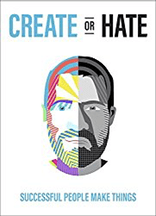Create or Hate. Successful People Make Things, by Dan Norris

Even if some factors that lead people to be successful could be attributed to sheer luck, a common trait is that successful people create things.
In Norris’ vision, creating something —that is, being creative— has little to do with wild talent and is more about productivity. The first requisite for being creative is to start to do something.
In his book The War of Art, Steven Pressfield writes about The Resistance, the voice that delays us from doing our work, the self-sabotaging habits of procrastination, self-doubt, susceptibility to distraction, perfectionism, and shallowness. Dan Norris’ nemesis to creativity is Hate.
“Haters don’t create anything, and instead get caught up in a never-ending cycle of Hate feeding Hate and criticism triumphing over creation.” The hate ecosystem nurtures from negative people that may surround us or work with us. However, what most hinders our capacity to do things is own self-hate.
It turns out that people can be very good at making up reasons [for not making things]. Not all reasons are invalid, but we have to beware of Hate breeding excuses.
Some common excuses are:
- It’s expensive
- I don’t want to divide my attention
- I don’t want to be one of those guys/gals that teaches people something before they know it themselves.
- There is too much effort needed to start
- The learning curve. I will definitely suck at the first try
- I see no purpose to get it going
- I don’t have what it takes
The second half of the book is about how to fight hate. For conquering hate, we need to accept failure as part of the creative process, an essential part of creating anything. Self awareness and gratefulness are our allies in our fight for being creative.
The final chapter gives practical advice that can give you some ideas on how to improve your creative process.
I specially liked to chapter on how empathy breeds creativity. Empathy is hard, and not commonly understood.
Your goal in being empathic is to imagine what it’s like to be that person and feel what they are feeling. If you can improve your empathy, you improve your imagination. And imagination is the source of all creativity.
The author is not shy about his own failures and learned lessons. For me, this showing himself vulnerable by reflecting about his own experiences is one of the things that makes the book valuable.